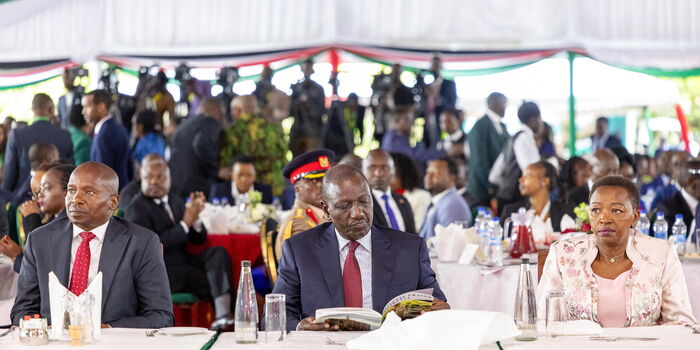President William Ruto has officially apologised to the people and government of Tanzania following recent diplomatic tensions that have strained the relationship between the two neighbouring countries.
Speaking during the National Prayer Breakfast held in Nairobi on Wednesday, Ruto offered the heartfelt apology on behalf of the Kenyan people.
His remarks came in response to a passionate plea by American preacher Rickey Allen Bolden, who urged leaders to embrace forgiveness and reconciliation for the sake of peace and unity in the region.
President Ruto said, “To our friends in Tanzania, if we have wronged you in any way, we sincerely ask for your forgiveness. To our brothers and sisters in Uganda, if we have done anything to offend you, please forgive us as well.”
He added, “We apologise to our children if we’ve made any mistakes that have affected their future. We also ask our neighbours to forgive us for any missteps. Our goal is to build stronger relationships that promote progress and development for all our countries.”
This apology comes at a time when Kenya has been facing internal and regional challenges. Last year, the country witnessed massive protests, especially by young people who took to the streets in opposition to the Finance Bill 2024.
The bill included harsh tax measures that sparked widespread anger. As a result of the public outcry, President Ruto suspended the signing of the bill and went on to reorganise his Cabinet, even appointing members from the opposition as a gesture of national unity.
However, tensions between Kenya and Tanzania escalated earlier this month after six Kenyans were deported from Dar es Salaam.
These individuals had travelled to Tanzania to attend a court session involving opposition leader Tundu Lissu.
Their deportation ignited a wave of criticism on social media, with citizens from both countries engaging in heated exchanges and political leaders coming under fire.
This diplomatic row reached a boiling point when Tanzanian Members of Parliament expressed deep anger over what they termed as disrespectful behaviour by Kenyan activists.
Many Tanzanian legislators voiced frustration over how Kenyan youth reacted to the deportations.
On Tuesday, Tanzanian MP Jesca Msambatavangu said she had been subjected to cyberbullying by Kenyan youths.
She explained that her phone was overwhelmed with calls and messages after she publicly criticised Kenyan activists for interfering in Tanzanian affairs.
The situation grew worse during a fiery session in the Tanzanian Parliament on Monday. Several lawmakers urged President William Ruto to take immediate steps to rein in Kenyans who, according to them, were showing disrespect towards Tanzanian President Samia Suluhu.
Meanwhile, Tanzania’s Home Affairs Minister, Innocent Bashungwa, has taken a hard stance on the matter.
While presenting his ministry’s 2025/26 budget, Bashungwa directed law enforcement agencies to take stern action against Tanzanians who were posting or sharing online content produced outside the country that disrespects President Suluhu.
He also called on the police to work closely with the Tanzanian Communications Regulatory Authority (TCRA) to identify citizens spreading foreign activist materials online. He insisted such individuals must be dealt with firmly under the law.
Adding to the regional concerns, on May 22, the Pan African Progressive Leaders’ Solidarity Network, under the leadership of Kenyan politician Martha Karua, wrote a formal letter to the African Union.
In the letter, the network demanded action against President Samia Suluhu over claims of illegally detaining Ugandan activist Agathar Atuhaire and her Kenyan counterpart, Boniface Mwangi.
While tensions seemed to be worsening, the situation took a slightly positive turn after both Mwangi and Atuhaire were eventually released from custody.
However, their release did not come without controversy. The two activists reported that they had been subjected to torture while in detention, an allegation that has further complicated relations between the two East African nations.
President Ruto’s public apology signals an effort to restore diplomatic ties and ease tensions with Tanzania and other neighbours.
It reflects a broader intention to strengthen unity within the East African region and promote peace, cooperation, and mutual respect among the member states.
Join Gen Z New WhatsApp Channel To Stay Updated On time https://whatsapp.com/channel/0029VaWT5gSGufImU8R0DO30


